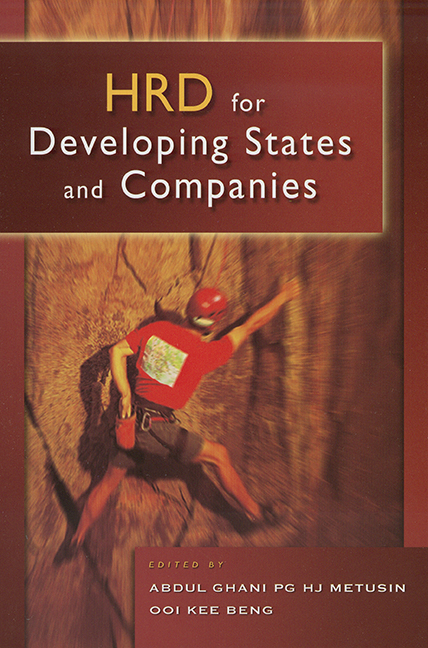Book contents
- Frontmatter
- Contents
- Foreword
- Preface
- Editorial Remarks
- Acknowledgements
- Introduction
- HRD for Statesmen
- 1 Human Resource Development in Developing Countries
- 2 Building the New HR Base — The Brunei Perspective
- 3 Managing and Achieving Excellence through HR Key Performance
- 4 Achieving an Integrated, Informed and Innovative Government for the Twenty-first Century — A Model for Emerging Markets
- 5 Human Resource Development — Challenges for the Public Services
- 6 Human-focused Management for Future Progress
- HRD Strategies for Companies
- Competence Development
- Corporate Experiences
- About the Authors
6 - Human-focused Management for Future Progress
from HRD for Statesmen
Published online by Cambridge University Press: 21 October 2015
- Frontmatter
- Contents
- Foreword
- Preface
- Editorial Remarks
- Acknowledgements
- Introduction
- HRD for Statesmen
- 1 Human Resource Development in Developing Countries
- 2 Building the New HR Base — The Brunei Perspective
- 3 Managing and Achieving Excellence through HR Key Performance
- 4 Achieving an Integrated, Informed and Innovative Government for the Twenty-first Century — A Model for Emerging Markets
- 5 Human Resource Development — Challenges for the Public Services
- 6 Human-focused Management for Future Progress
- HRD Strategies for Companies
- Competence Development
- Corporate Experiences
- About the Authors
Summary
For some years, I have witnessed the increasing sense of international spirit and partnership that translates into important conventions. I believe the ASEAN-EC International HRD Convention is becoming a successful model for international cooperation. Since human capital development is a most important key to competitiveness and sustainable growth, cooperation between ASEAN and EC can be crucial to the development of human resource in ASEAN countries and beyond. It can inspire governments, business organizations, and civil society organizations to better ways of developing human resource and organizations. ASEAN-EC cooperation in human resource development should be congratulated on its past successes and is to be encouraged.
CHANGING PUBLIC SECTOR CONTEXTS AND PRIVATE MANAGEMENT IN ASEAN
A critical question confronting executives of private and public sector organizations in ASEAN countries today is not whether to change in response to their swiftly changed environment, but precisely how to manage that change. How do they modify organizational cultures and structures, and develop new capabilities to effectively cope with new challenges and uncertainties?
How, in particular, do they develop the human resource of their organizations to build up competitive capabilities for future progress and sustainable growth? What does it take for private and public organizations to succeed at human resource development?
This chapter begins with a new set of assumptions underlying the current economic, social, technological environment. Through this concept of changing realities, new capabilities of organizations and human resource in ASEAN countries can be identified. A key management strategy towards sustainable competitive capability is proposed. The chapter outlines a model for human-focused management to create new capabilities. The Siam Cement Group of Thailand is a case study of a successful organization that gives high priority to human resource development. The chapter ends with a brief discussion of organizational, structural and cultural constraints on human resource development.
- Type
- Chapter
- Information
- HRD for Developing States & Companies , pp. 32 - 44Publisher: ISEAS–Yusof Ishak InstitutePrint publication year: 2005



